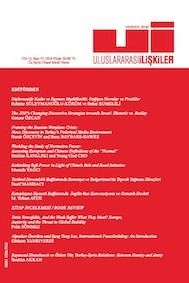
Uluslararası İlişkiler Dergisi
Yazarlar: Emre İŞERİ
Konular:-
Anahtar Kelimeler:Oil Prices,Hegemonic Stability,Global Energy System
Özet: This paper examines the link between petro-dollar underpinned US hegemony with the coming global peak oil age in which volatile high oil prices will be a structural problem. Without attempting to pin down the exact timing of global peak oil, this paper assumes that global peak oil will indeed come to pass in the foreseeable future and will have significant implications on the global economy and global energy infrastructure. The paper mainly argues that sustaining American petrodollar hegemony would be a much more difficult at the eve of global peak oil due to two main reasons: First, a tendency among oil-exporting countries to accept a currency that has potential to challenge the principal reserve status of the dollar, the euro. Second, increasing reliance on alternative resources to oil, in particular natural gas is significant. Since the age of global peak oil will arrive sooner or later, US policymaking elites should understand that current international energy infrastructure is not sustainable and they need to take the required measures to increase the portion of renewables among energy resources to fuel the global economy